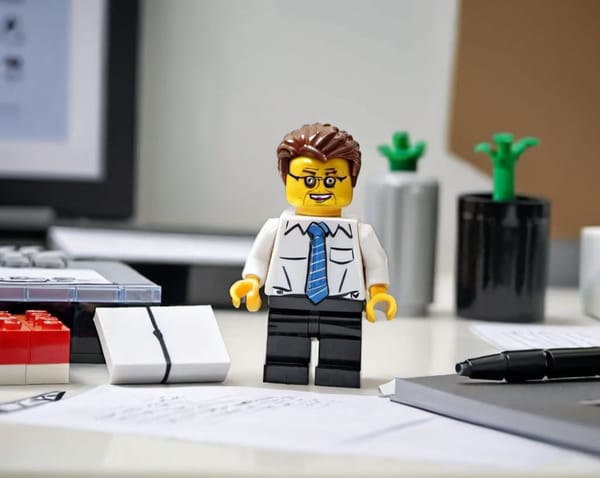Story Time: The 30 (b) 6 deposition
A special type of deposition, a lot of trust, and an experience I hope to never replicate.

A 30 (b) 6. in August 2011, I was tagged to do the second rule 30 (b) 6 deposition. The first one was done about a year earlier by my then boss, the VP of product management. As this was a complicated patent lawsuit, the court deemed that the plaintiff (not us) could have a second dip at the well of the 30 (b) 6.
I was tapped in for this, and it led to an intense month of preparation.
A 30(b)(6) deposition is a type of deposition in which a corporation or organization designates one or more representatives to testify on its behalf 1234. The representative(s) must have knowledge of the organization’s policies, procedures, and practices, and must be able to provide binding testimony on behalf of the organization 4. This type of deposition is often used in complex litigation cases where the organization is a party to the lawsuit 4.
As you might surmise from the summary above (created by Chat GPT via Bing) it essentially promised that I would be able to sit for 8 hours, and answer ANY question about the business that the opposing counsel could ask. Financial performance? Development methodology? Sales Strategy (as long as it wasn’t proprietary)? Details bout our documentation? Dates of major milestones (release dates, functionality addition to the code, etc)? General outlines of our support process, and even details (minus names) of our customers.
The lawsuit was your classic patent-troll action, and the claims that they had made (and gotten a patent for) was for a functionality that we had released commercially more than four years before they even applied for a patent. We should have been able to swat it away, but (shrugs shoulders).
Back to the deposition:
I had about 5 weeks to prepare, and holy shit, it was a mountain of information to digest. My boss (the VP/GM) assigned it to me, and said that I had no other responsibilities until after the deposition.
Gulp.
The prep included two multi-day trips to our lawyers (in Chicago) as well as them coming to our offices for touch-ups.
I pored over MOUNTAINS of financial records, deep dive into the product, the org structure, the history of the development, and when major milestones occurred, a deep dive into the chief competitors, significant business partners, our 3rd party integrations, … well, you get the idea. It was a rather intense prep period.
The day came. I flew into Chicago (the deposition was at our law offices) and a light review session mid afternoon, and the directive to do some last minute cramming, and to get a good night’s sleep.
The deposition was … weird.
We met in the office at 8:00. The scheduled start was at 9:00 sharp. The opposing team (two attorneys, a steno, and a videographer) were all set up in the room. I was well caffeinated, I had a hearty breakfast, I had some attaboys from our team, and we walked in.
Gotta tell you that it is intimidating to be across from the counsel at the table. I was facing the camera, and I had my two attorneys as my wingmen. They liberally objected, and raised issues throughout.
The first session lasted about 45 minutes, and when we broke, my attorneys took me into our war room, and roasted me.
Silly me, I was answering questions, going beyond the minimum, and being helpful. I ws told to stop that shit right now. In fact I was to answer only what was asked. Nothing more. If their attorneys didn't dig deeper, then fuck ‘em.
The second session we ran until lunch time. They brought in some Chicago style deep dish pizza (they ordered mediocre sandwiches for the opposing team :-) ) that was awesome. The second session went much better.
Later in the day, the questions veered into finance. They would present me a page that was badly photocopied1, and ask a question, I would look through what they showed me, and I would answer the question - s l o w l y.
Whenever they handed me a document, I paused to read it thoroughly. A tactic I was taught, even though I knew what was on the document, but as a way to slow walk the session. The 30 (b) 6 is a special deposition. They can ask ANY question, and I had to answer truthfully. But they only get 8 hours of time.
Later in the day (near the end) they dove into our documentation. The case was about a specific feature (received facsimiles being routed to email as a TIFF image) and as I mentioned above, we had delivered this LONG before they filed the patent.
Anyhow, they had the printed manual from 1992. I read the section on email routing. They handed me the next version manual, I read that section. They handed me the next version’s printed manual. Same.
About 30 minutes later I had about 3 feet (1 meter) of stacked printed manuals. I asked if it was OK to move them as I was worried that they might fall on me.
Not much later the session was over, I was shuffled to the war room, and we debriefed. After the first “over sharing” I learned to be more reticent, and cautious. I was also fêted for my asking to move the mountain of printed documentation. I mentioned that if I was on the other side of the table, I would have torn my own testimony to shreds. They were so close to getting me to admit something that was unfavorable. But their attorney would stop the line of questioning.
After we were done with the debriefing, our team had reservations at Gibsons, arguably the best steakhouse I have ever eaten at. I was plied with Manhattans, a neat Pappy Van Winkles, and a massive bone in Ribeye that was to die for.
What I learned
First - product managers often know more about the business than the executives. As we were preparing, and as part of it we were looking at what would happen if we lost. Turns out that our pricing model would minimize the damages. The execs didn't know enough to articulate how the prices were distributed between servers and capacity. We just know enough to connect the dots.
Second - You really want good legal counsel on your side of he table. Our lawyers were amazing, and they were worth every penny. I never knew how much it was costing, but it was pricey.
Third - listen carefully to what your counsel tells you. Seriously, as much as I rag on lawyers, they are wicked smart, and they know what they are doing. Listening to them can really prevent you from fucking up majorly.
Fourth - If you are talking about anything that might be a problem in discovery (and I can assure you that if they dig into your email, they will find something that will be super embarrassing. Learn to use the phrase “at the advice of counsel, attorney-client privilege” and to CC one of your lawyers into the thread. If you need to do this, you will know it, and you will be thankful for the advice.
Fifth - if there is anything on your laptop, or in your work product (if you know what that means, you and I share a special bond) that is incriminating, discovery will uncover it. I got to watch a discovery specialist clone my hard drive, and then search it thoroughly. There is no hiding things. I don’t care how good you are at obfuscation, it will surface.
Really, best to just avoid having to be involved if you can help it.
By badly photocopied, I mean like if the top was open, and the page wasn’t flat on the glass, so it was partially dark. Turns out this is pretty standard, we *could* have provided digital copies of all the discovery information, but why make it easy for the opposing counsel to find anything.




